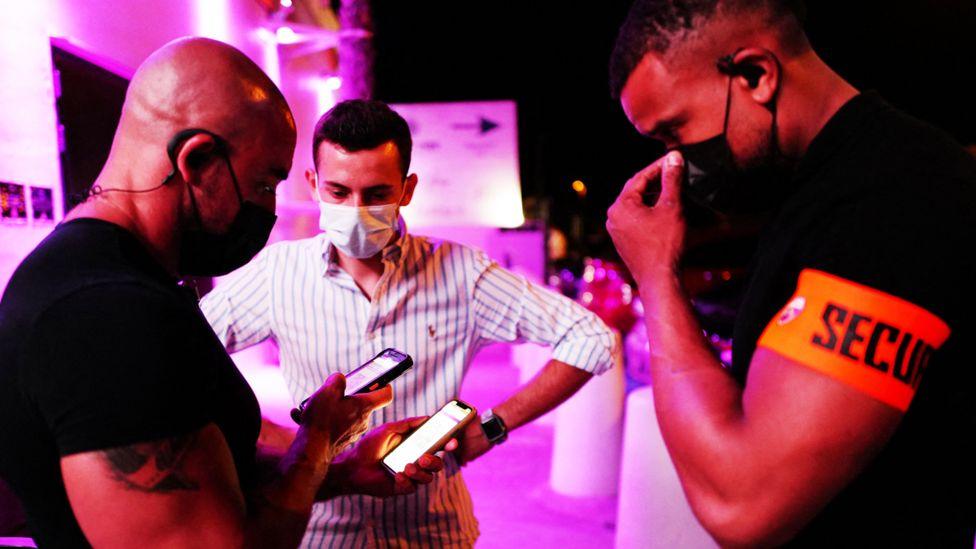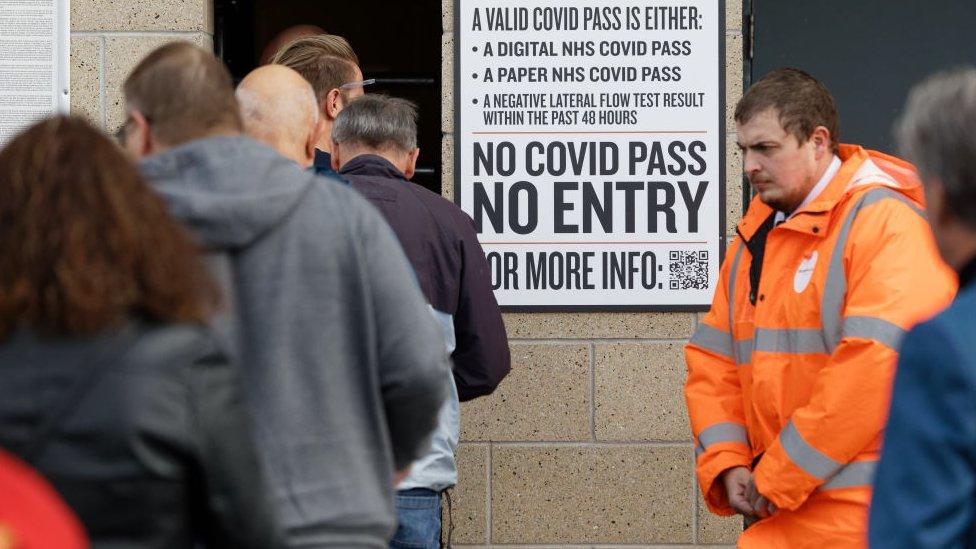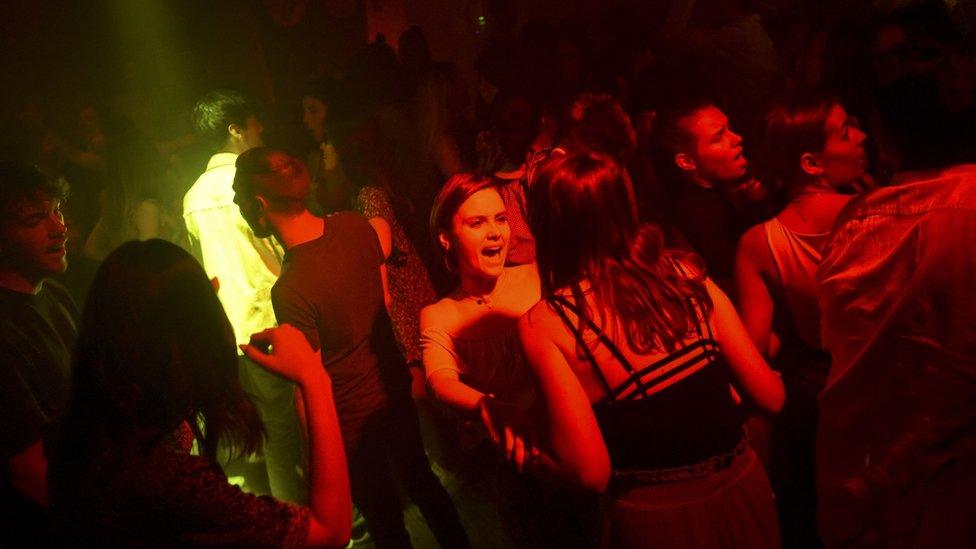Covid in Scotland: Vaccine passport scheme enforceable by law
- Published
- comments

People attending nightclubs and other large venues will have to be able to show proof of two Covid jabs
The Scottish government's vaccine passport scheme has become enforceable by law from Monday morning.
Nightclubs and large events, like some football matches, will only be able to allow entry to people who can show they have had two doses of a Covid vaccine.
The scheme came into effect on 1 October after MSPs voted to back the proposals.
Businesses were given a 17-day "period of grace" to allow venues time to test out their procedures.
People who have had two vaccines in Scotland can download or get a paper copy of a certificate with a QR code, external.
Everyone over the age of 18 must now show - if asked - that they have had both doses of the vaccine before they are allowed entry to certain venues and events. These include:
Nightclubs and "analogous venues"
Adult entertainment venues
Unseated indoor events with more than 500 people, even if some are seated
Unseated outdoor events with more than 4,000 people
Any event with more than 10,000 people in attendance
The scheme requires venues to put in place a "reasonable system" to check the status of customers, with certain exemptions on medical grounds.
First Minister Nicola Sturgeon has said that the hospitality industry as a whole would not be included in the scheme, although that decision would be kept under review.

Some football clubs have already been asking fans to provide a valid Covid pass before entering stadiums
The government also said there would be no need for a vaccine passport to access public services or settings where people have no choice over attendance - such as shops, public transport, education and medical services.
People 'unaware' they need passport
Businesses say they have already experienced a "number of issues" with the scheme - including customers being unaware they need a passport to gain entry.
Leon Thompson, UK Hospitality Scotland director, said public awareness had been a "missing piece of the jigsaw".
He told BBC Radio's Good Morning Scotland programme: "Customers need to be ready, they need to play their part and they need to understand what they have. They will need to come with the right frame of mind and be ready to be patient if they encounter queues."
Mr Thomson added that the pandemic and Brexit had resulted in "chronic" shortages of door staff, which meant that checking people's vaccination status would remain a "key challenge" for businesses.
Responding to the public awareness issue, Health Secretary Humza Yousaf told the programme hundreds of thousands of people were using the scheme.
He said: "Over 700,000 have downloaded the app and well over 750,000 have a paper copy - of course some people who have a paper copy will also have the app so that's not necessarily unique users.
"It says to me there are a number of people who have awareness. Where we can up the communication around this we have intentions to do so - we already have over the last two weeks."

Hospitality sector said customers have been turning up to venues unaware they need Covid passports
In addition to the passport, a number of countries including Wales also require people to provide a negative test result before they can enter venues.
Asked whether the Scottish government would consider this measure, Mr Yousaf said they "wouldn't completely discount it", but were initially put off by people being able to give fake test results.
He said: "The reason we haven't started in that place is because there can be some flaws with unsupervised [lateral flow tests] - people can falsify an unsupervised LFD.
"Therefore we think that the most robust system to have in place to launch with is a scheme that involves showing you are fully vaccinated. That will be part of the considerations we make in the three-weekly review cycle."
Death rates 'unacceptable'
Public health expert Jillian Evans, of NHS Grampian, said Scotland was likely to have to live with the measure until the vaccination uptake was much higher, especially in younger people.
She told the BBC: "I think although it was announced as being the secondary purpose behind the vaccine passport, getting people vaccinated, I wonder if it was the primary reason.
"Scotland's vaccination uptake has been increasing since August, it's really caught up with other UK countries, in fact Scotland and Wales have the highest rates of double dose vaccination uptake in the UK."
Ms Evans added that Scotland could not live with its current Covid rates and that she was "really worried" about how the NHS would cope over the winter period
She said: "We know also, in my own area in particular, the number of people admitted to hospital with symptoms is still increasing. That's counter to fallen case rates which suggests that we're not detecting as many people out there - we may be underestimating the number of people with the virus."
'Test and protect collapse'
Problems were reported with the NHS Scotland Covid Status app after it was made available to download on Apple , externaland Android, external devices on 30 September.
The Scottish government has insisted technical issues linking the app to the NHS system have since been ironed out.
The app allows people to register, using their passport or driving licence to verify their identity, and then creates a QR code for each vaccination.
It is similar to schemes used in other countries across Europe.
Scottish Labour's health spokesperson Jackie Baillie described the government's launch of the app as a "shambles".
She said: "If we want to control the virus we must look at proper resourcing of our test and protect system which has collapsed in recent weeks.
"If we want to drive up vaccination we should be going door-to-door to convince those we know are hesitant and making it easier to just walk in for an appointment.
"Instead, the government is doubling down on this mess."
Elsewhere in the UK, Wales plans to introduce its own Covid passport rules later this month but England has scrapped similar plans.
Northern Ireland has yet to announce a formal vaccination passport scheme.

